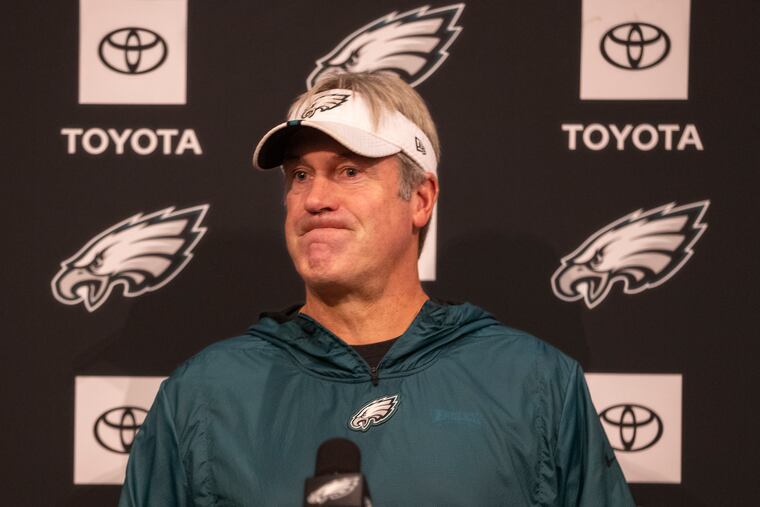Are the Eagles on the way to becoming the Phillies? | Bob Ford
The teams share some of the same issues. High expectations? Check. Under-performance? Check.

The team started the season with high expectations. Most fans agreed that a division title was the lowest bar it would clear. But expectations are not guarantees.
Some players under-performed, or at least failed to progress, and then a devastating series of injuries lowered the talent level ever further, making every game a difficult path to navigate successfully.
A major organizational failing was that the farm system hadn’t produced quality alternatives, either to put on the field and contribute, or to use as bargaining chips in a trade. The season stuttered along, walking the thin line of playoff eligibility, before it collapsed in a heap near the finish.
That is the story of the 2019 Phillies, a tale that reached its coda last week when owner John Middleton fired manager Gabe Kapler, whose crime was being the most obvious face of the failure. In all of sports, there is no field general who has less to do with a team’s success than a major-league manager, but nevertheless, that is the course Middleton steered.
That story might also become the story of the 2019 Eagles.
After six games, nearly 40 percent of the regular season, how does the comparison stack up?
High expectations? Check.
Under-performance? Check.
A raft of injuries? Check.
Flirting with the playoffs, but failing to actually ask them out? Check.
Unlike Kapler’s fate, whatever happens with the Eagles this season is unlikely to cost Doug Pederson his job. That Super Bowl trophy in the lobby buys a guy some time, and it should.
What is taking place with the Eagles — particularly in the wake of Sunday’s 38-20 butt-kicking in Minneapolis that dropped them to .500 — certainly reflects on the coaching staff, but is more a product of the roster Pederson has under his control.
You can take issue with some of the strategic decisions, but it’s not as if the coaching staff makes them without thought. It was determined that selling out to stop the Vikings’ running game, led by Dalvin Cook, the second-leading rusher in the league, was the way to go Sunday, and made perfect sense. That it also required a greater reliance on the secondary to rein in Kirk Cousins was an imperfect byproduct. Like, way imperfect.
Where the comparison with the Phillies might be most apt is the failure of the farm system to fill the wood bin with enough talent to keep the fire stoked. Injuries happen to every team in every sport. Whom do you have to fill the gaps when they occur?
In the NFL, the farm system is college football, and the annual dispersal of its best players in the draft. Few things are less certain than the performance of a football player making the physical and mental leap from the NCAA to professional football. But the constant is that being successful with those predictions is often what separates bad organizations from good ones, and, farther up the narrowing pyramid, separates the good from the great ones.
Since Howie Roseman regained full control of player personnel in 2016, the Eagles have selected nine players in the first three rounds of the draft, when the projections should be the best. All nine of them are on the active roster, which is good. Of course, two of them are cornerbacks Sidney Jones and Rasul Douglas, which, at least this week, isn’t so good.
If Jalen Mills, Ronald Darby, and Avonte Maddox were available to play, it is likely neither Jones nor Douglas would be on the field. The reality is that, aside from Carson Wentz, the haul from the top rounds of the last four drafts is pretty spotty.
Dallas Goedert might become really good, and the three 2019 high picks — Andre Dillard, Miles Sanders and J.J. Arcega-Whiteside — are too new to dismiss, but what else? Isaac Seumalo is a starter by default. Derek Barnett is all right, but he’s just a guy, not what you expect from the 14th pick in the draft. And then there are the cornerbacks.
Again, the draft is a crapshoot, but the Eagles’ performance in that arena is a factor this season. Pederson and his staff are doing the best they can with what they have, but what they have at the moment is not the best.
The coaches aren’t blameless, of course, and neither are the players who blow assignments and commit dumb penalties. Pederson got testy Monday when he inferred that his preparation of the team was being questioned. Well, yes, Doug. Take the opening kickoff and march down for a touchdown now and then. It’s possible that would help.
In any case, when the season is over, even if it continues to circle the drain and disappear, there’s no way Jeff Lurie will sit at a press conference table — as did Middleton — and bring about significant change. Pederson isn’t Gabe Kapler, heaven knows, and Lurie didn’t even fire Roseman when Chip Kelly won the power struggle between the two. The loser of those internal wars always has to leave, but not here.
Just like the Phillies, the Eagles are largely victims of bad luck with injuries and with some of their judgment calls. Unlike the Phillies, they have a very recent championship in the back pocket.
Time goes by quickly, however, and yesterday’s parade eventually begins to look like tomorrow’s cortege. If the Eagles are unconvinced, they can ask the Phillies.